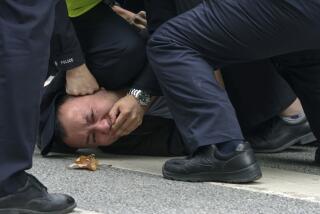China’s plan for secret detentions alarms rights activists
- Share via
Reporting from Beijing — A proposed change in the Chinese criminal code that would allow authorities to detain suspects for up to six months in a secret location is a dangerous step backward for the country, activists charged Saturday.
The change would essentially enshrine what has become a common practice for silencing dissidents, many of whom have disappeared for months without formal charges being filed. Under the change, the suspects could be held without their family members or lawyers being notified.
The proposed change in the law was disclosed last week in the respected Legal Daily.
“This new amendment will legalize ‘forced disappearance,’” Beijing attorney Liu Xiaoyuan wrote on Twitter on Saturday. Liu was briefly detained around the same time as his friend and client Ai Weiwei, the dissident artist whose arrest this spring made international headlines.
Under current law, a person suspected of a crime but not formally charged could be put under house arrest for six months.
The amendment would allow the “residential detention” to be moved to an undisclosed location in “special cases involving national security, terrorism and major bribery, if detaining the suspect at his home will put an obstacle on solving the case,” the legal newspaper reported. The location would not be a “regular detention center or police station.”
“If you are taking somebody elsewhere than a lawfully supervised place of detention without notice, it greatly increases the risk of torture,” said Nicholas Bequelin of Human Rights Watch.
Ai was held for 2 1/2 months without charge, most of the time without his family knowing his whereabouts. His case didn’t involve national security or terrorism, but alleged tax evasion.
China is in the process of revising its criminal code, which has not had a major overhaul since the mid-1990s. Bits and pieces have been leaked to the media in recent days, some of them winning praise from human rights advocates. For example, another revision would ban the use of evidence obtained by torture in criminal cases. Also, family members of defendants would not be compelled to testify against them.
“Rapid economic and social development, the public’s growing awareness of democracy and the rule of law, as well as an increase in the number of cases means that the law must be revised,” Lang Sheng, an official drafting the revisions, told a committee of the National People’s Congress during a hearing Wednesday, the state press reported.
Bequelin speculated that there might have been a political deal under which the Public Security Bureau swallowed the ban on torture on the condition that it be allowed the secret detentions.
“There are supposed to be some substantial improvements in the law,” he said, “but this particular one [on detentions] seems to be a big step backwards, and a dangerous one at that.”
More to Read
Sign up for Essential California
The most important California stories and recommendations in your inbox every morning.
You may occasionally receive promotional content from the Los Angeles Times.













